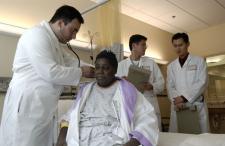Aggregated News

THE POWER OF artificial intelligence has transformed health care by using massive datasets to improve diagnostics, treatment, records management, and patient outcomes. Complex decisions that once took hours — such as making a breast or lung cancer diagnosis based on imaging studies, or deciding when patients should be discharged — are now resolved within seconds by machine learning and deep learning applications.
Any technology, of course, will have its limitations and flaws. And over the past few years, a steady stream of evidence has demonstrated that some of these AI-powered medical technologies are replicating racial bias and exacerbating historic health care inequities. Now, amid the SARS-CoV-2 pandemic, some researchers are asking whether these new technologies might be contributing to the disproportionately high rates of virus-related illness and death among African Americans. African Americans aged 35 to 44 experience Covid-19 mortality rates that are nine times higher than their White counterparts. Many African Americans also say they have limited accessto Covid-19 testing.
During the early weeks of the pandemic, there werefew — if any — Covid-19 testing locations in African...



